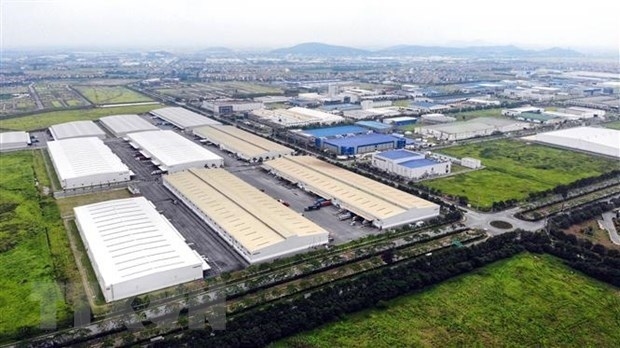Vietnam’s real estate sector continues record run: Forbes
Vietnam’s real estate market recommenced its record run, with the industrial sector viewed as the star of the industry thanks to the country's success in combating COVID-19, said a story by Philip Heller published on Forbes earlier this week.

Vietnam’s real estate market recommenced its record run, with the industrial sector viewed as the star of the industry thanks to the country's success in combating COVID-19, said a story by Philip Heller published on Forbes earlier this week.
“Office rents rising in 2020? Positive GDP growth during a global health crisis? Seems unimaginable, unless you live in Vietnam,” the story started.
The country’s list of feats this past year has been remarkable given the current health and economic hardships across the world, it said, adding Vietnam had gained incredible success containing COVID-19, with the country of 96 million people registering only 2,631 cases and 35 deaths at the time of publishing.
During the same period, Vietnam eclipsed all of its Asian rivals economically by posting GDP growth of 2.9%, a noteworthy feat considering the GDPs of neighboring Thailand and Malaysia contracting by 6.1% and 5.6%, respectively, in 2020.
Consequently, Vietnam’s real estate market has flourished in recent years, with continued economic growth leading to a surge in property prices.
The country’s real estate market proved resilient during the pandemic, with both the industrial and residential sectors leading the pack.
The star of the local real estate market is the industrial sector, which has been a beneficiary of a manufacturing boom. In recent years, companies such as Nike, Adidas, and Samsung have moved their operation into Vietnam.
The market has also responded to the increased manufacturing demand, as the Ho Chi Minh City industrial rents grew by 9% in 2019 and then 10.6% in the pandemic year of 2020, according to Cushman & Wakefield.
Vietnam’s housing market has also seen unprecedented growth in recent years. As local Vietnamese have limited investment options outside of the housing market, rampant demand for apartments has exceeded the supply of units, with many new developments selling out shortly after sales launch like hot cakes.
According to Cushman & Wakefield, apartment prices in the country's biggest metropolis have risen in response and grew by a staggering 90% in the three years from 2017 to 2020, especially by 12.8% in 2020 alone.
While demand from foreign investors is one of the factors pushing the market, the majority of the growth comes from Vietnamese citizens (in any new apartment development, foreigners are only allowed to own up to 30% of the total units).
As such, the country’s economic progress coupled with a rapidly expanding middle class is the primary demand driver for the expansion of the housing market, with few signs pointing to a slowdown anytime soon.
In the office segment, Forbes quoted Cushman & Wakefield as saying that Vietnam’s economic growth spurred Ho Chi Minh City’s office rents to rise by 1.7% in 2020 despite the difficult headwinds, while nearby cities such as Bangkok, Singapore, and Hong Kong (China) all saw office rents decline in 2020.
As the future of the segment remains uncertain across the world, working habits in Vietnam appear less likely to change given the country’s short lockdown period as well as limited technological infrastructure.
For the hotel market, 2020 saw losses in the segment, like the rest of the world, with occupancy hovering between 20-30% for most of the year.
While the recovery is expected to be gradual, the outlook remains strong given the country’s travel industry was taking off pre-pandemic.
Economic progress led to increased business travel while Vietnam simultaneously became a sought-after vacation destination for foreigners. The Vietnamese government is encouraging this growth by heavily investing in travel infrastructure.
Vietnam is expected to be a favourable destination for investment going forward, and interest from institutional investors has propelled the country’s foreign direct investment to grow by 75% from 2014 to 2019.
Though the country remains a developing market, this has not dissuaded investors who are confident in the country’s long-term prospects.
With the government targeting 6.5% GDP growth in 2021, Vietnam’s real estate market is poised to ride the economy’s tailwinds into the future.
